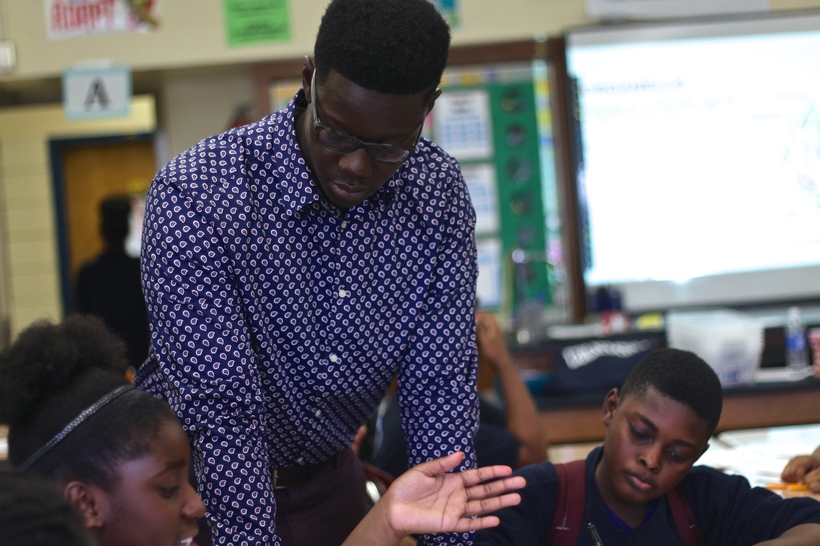As the school year winds down and comes to an end, teachers begin removing prized student work off of bulletin boards; classroom materials and supplies are stored away neatly for use during the next school year, and students are eagerly awaiting the last day of school to arrive, so they can begin their well-deserved summer vacation. Unfortunately, one thing that awaits many students, especially inner-city students, once they begin their summer vacation is something that educators refer to as “summer slide”. Not nearly as fun as an actual slide that one will find in a park, the term “summer slide” refers to a student’s loss of content knowledge and reading skills during the extensive three-month summer vacation.
During the summer, many students’ minds remain idle and are rarely challenged. Students whose families do not have access to the resources that provide extracurricular activities, such as summer camp, are more likely to suffer academically beginning the next school year. They will be behind their counterparts who on the other hand are academically engaged during the summer. Also, as school closes during the summer months, many low-income students will no longer have access to free the nutritional meals, which are offered daily during the school year.
Studies show that there are over 21.5 million students across the country who receive free or reduced lunch during the school year. With schools out of session, I can only imagine how many students will not have access to nutritional meals and activities to stimulate their minds. Therefore, it is crucial for families and communities to provide much support and guidance to children and teens during the summer months with the goal of avoiding the summer slide.
The “required” summer readings and summer packets that almost every teacher assigns their students this time of year are ineffective because far too often they are not culturally relevant to students. It also reminds students of how unexciting school can be. Besides, the summer should be fun and engaging. Children desperately deserve a break from the rigid structure of the school system and an opportunity to engage in interactive educational activities and strategies, which I will lay out for you. During this summer parents should allow children to explore what they love. Give them the tools to be creative, and show them that it is fine to fail, and most importantly show that learning can be fun and exciting.
- Set aside the time – With school out of session, most children do not have a scheduled time to engage in an academic activity. In the beginning of the summer, parents should create a schedule with their children of at least seven hours a week in which their child is participating in an educational activity. It may be challenging for children to adhere to the schedule at first, but after a few occurrences and engaging activities it will become a ritual and children will set time aside to focus on their education on their own. Additionally, it is great when parents join their children and assist with their learning or, at least, work on their own responsibilities, while the child participates in their activity. It’s always great when parents lead by example.
- Multimedia Reflections – Everyone enjoys music and movies, especially students of the Hip – Hop generation. One interactive activity any child can participate in, is writing a reflection about songs and/or movies that they enjoy. Children can find the lyrics to any song online read and annotate them while listening to the song. Then, they can write a one-page reflection about what they enjoy about this song, how it relates to them, and what is the message that the song is trying to convey. Same idea with a movie, students can write about why they chose that movie, how it relates to their life, experiences and community.
- Review Packet – We all know that many students throw away their notes and books after the school year is completed. Have your student keep all of their notes to create a summer review packet. Children can review material from the previous year and master previously learned content. What better way to avoid the summer slide by reviewing content from the previous year?
- Community Look Book – In this digital age, most people enjoy taking pictures of themselves and of things that they enjoy. Allow children to gain a greater appreciation for community by taking pictures of aspects of their community that they enjoy, and aspects, which they don’t enjoy. With those images, students can create a look book of their community and annotate the photos describing what they appreciate and why. Children can also describe what they do not appreciate about their community and what they would do to change that aspect of their community. Children can show off their look book to family members, community members, and politicians in their community. This is not only an interactive activity, but also an opportunity to charge children with the tools to become activists in their community and have a voice that can bring fourth change.
- Cultural Research – All children have a unique cultural background, which has shaped their life experiences. Encourage children to research their culture, ancestry, and family lineages. Children can interview family members for facts and anecdotes, and use other resources that are at their disposal. Once the research is complete and organized, it can be presented to family members and community members. This is a great way for students to independently learn about aspects of life that they might not necessarily be keen to.
– See more at: http://goodmenproject.com/uncategorized/5-ways-for-your-child-to-creatively-avoid-the-summer-slide-kerj/#sthash.HxGxw7kb.dpuf








